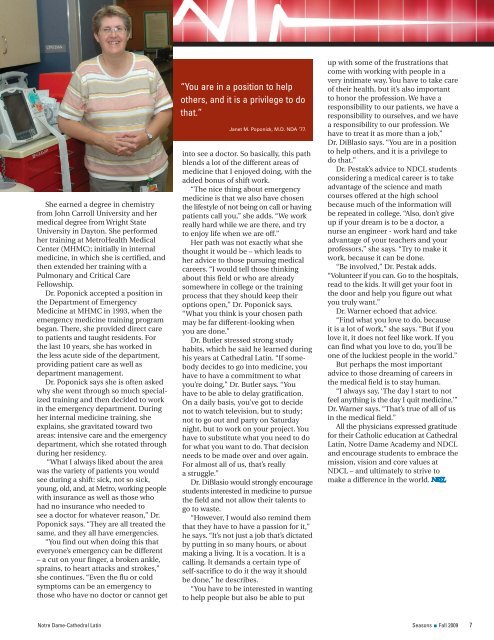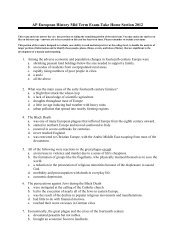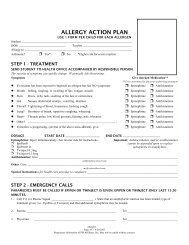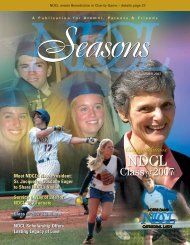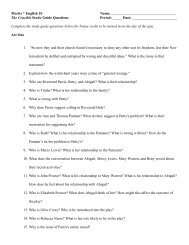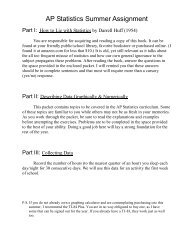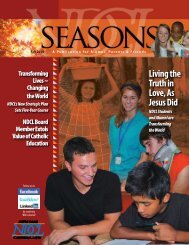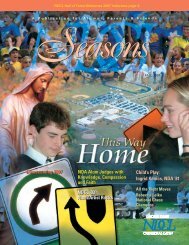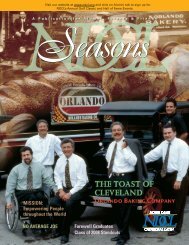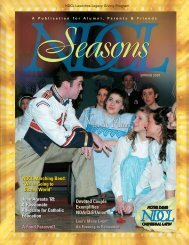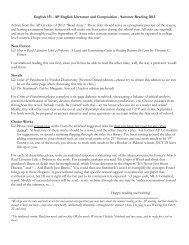You also want an ePaper? Increase the reach of your titles
YUMPU automatically turns print PDFs into web optimized ePapers that Google loves.
She earned a degree in chemistryfrom John Carroll University and hermedical degree from Wright StateUniversity in Dayton. She performedher training at MetroHealth MedicalCenter (MHMC); initially in internalmedicine, in which she is certified, andthen extended her training with aPulmonary and Critical CareFellowship.Dr. Poponick accepted a position inthe Department of EmergencyMedicine at MHMC in 1993, when theemergency medicine training programbegan. There, she provided direct careto patients and taught residents. Forthe last 10 years, she has worked inthe less acute side of the department,providing patient care as well asdepartment management.Dr. Poponick says she is often askedwhy she went through so much specializedtraining and then decided to workin the emergency department. Duringher internal medicine training, sheexplains, she gravitated toward twoareas: intensive care and the emergencydepartment, which she rotated throughduring her residency.“What I always liked about the areawas the variety of patients you wouldsee during a shift: sick, not so sick,young, old, and, at Metro, working peoplewith insurance as well as those whohad no insurance who needed tosee a doctor for whatever reason,” Dr.Poponick says. “They are all treated thesame, and they all have emergencies.“You find out when doing this thateveryone’s emergency can be different– a cut on your finger, a broken ankle,sprains, to heart attacks and strokes,”she continues. “Even the flu or coldsymptoms can be an emergency tothose who have no doctor or cannot get“You are in a position to helpothers, and it is a privilege to dothat.”Janet M. Poponick, M.D. NDA ’77.into see a doctor. So basically, this pathblends a lot of the different areas ofmedicine that I enjoyed doing, with theadded bonus of shift work.“The nice thing about emergencymedicine is that we also have chosenthe lifestyle of not being on call or havingpatients call you,” she adds. “We workreally hard while we are there, and tryto enjoy life when we are off.”Her path was not exactly what shethought it would be – which leads toher advice to those pursuing medicalcareers. “I would tell those thinkingabout this field or who are alreadysomewhere in college or the trainingprocess that they should keep theiroptions open,” Dr. Poponick says.“What you think is your chosen pathmay be far different-looking whenyou are done.”Dr. Butler stressed strong studyhabits, which he said he learned duringhis years at Cathedral Latin. “If somebodydecides to go into medicine, youhave to have a commitment to whatyou’re doing,” Dr. Butler says. “Youhave to be able to delay gratification.On a daily basis, you’ve got to decidenot to watch television, but to study;not to go out and party on Saturdaynight, but to work on your project. Youhave to substitute what you need to dofor what you want to do. That decisionneeds to be made over and over again.For almost all of us, that’s reallya struggle.”Dr. DiBlasio would strongly encouragestudents interested in medicine to pursuethe field and not allow their talents togo to waste.“However, I would also remind themthat they have to have a passion for it,”he says. “It’s not just a job that’s dictatedby putting in so many hours, or aboutmaking a living. It is a vocation. It is acalling. It demands a certain type ofself-sacrifice to do it the way it shouldbe done,” he describes.“You have to be interested in wantingto help people but also be able to putup with some of the frustrations thatcome with working with people in avery intimate way. You have to take careof their health, but it’s also importantto honor the profession. We have aresponsibility to our patients, we have aresponsibility to ourselves, and we havea responsibility to our profession. Wehave to treat it as more than a job,”Dr. DiBlasio says. “You are in a positionto help others, and it is a privilege todo that.”Dr. Pestak’s advice to NDCL studentsconsidering a medical career is to takeadvantage of the science and mathcourses offered at the high schoolbecause much of the information willbe repeated in college. “Also, don’t giveup if your dream is to be a doctor, anurse an engineer - work hard and takeadvantage of your teachers and yourprofessors,” she says. “Try to make itwork, because it can be done.“Be involved,” Dr. Pestak adds.“Volunteer if you can. Go to the hospitals,read to the kids. It will get your foot inthe door and help you figure out whatyou truly want.”Dr. Warner echoed that advice.“Find what you love to do, becauseit is a lot of work,” she says. “But if youlove it, it does not feel like work. If youcan find what you love to do, you’ll beone of the luckiest people in the world.”But perhaps the most importantadvice to those dreaming of careers inthe medical field is to stay human.“I always say, ‘The day I start to notfeel anything is the day I quit medicine,’”Dr. Warner says. “That’s true of all of usin the medical field.”All the physicians expressed gratitudefor their Catholic education at CathedralLatin, Notre Dame Academy and NDCLand encourage students to embrace themission, vision and core values atNDCL – and ultimately to strive tomake a difference in the world.Notre Dame-Cathedral Latin Seasons <strong>Fall</strong> 2009 7


